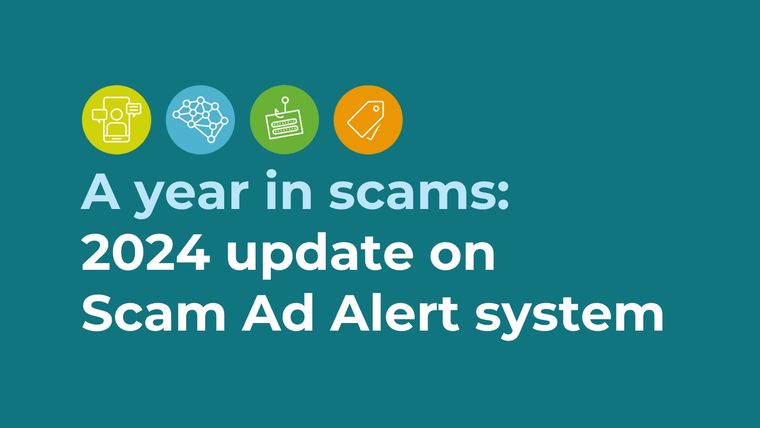
The ASA operates the Scam Ad Alert system in partnership with major online ad and social media platforms to help tackle scam ads in paid-for space online. In 2024 the ASA received 1,691 reports of potential scams via our quick reporting form. As a result, 177 Scam Ad Alerts were sent to platforms to remove ads and further act on intelligence.
Our system aims to complement and enhance the work already being done by digital advertising and social media platforms and other regulatory and law enforcement bodies to tackle scam ads and, more broadly, other fraudulent activity online.
Read on for an update on some of the biggest trends we observed in scam ads last year, get tips on how to avoid those scams and hear more on the impact of our Scam Ad Alert system.
Four big scams trends in 2024
1. Celebrity and public figure scams
Scam ads featuring celebrities continued to make up the vast majority of Scam Ad Alerts we sent in 2024. The public interest in celebs and other public figures means scammers continue to turn to them to promote cryptocurrency, investment, keto slimming gummies and the like. We saw a wide range of public figures used in scam ads last year, from Keir Starmer and Rachel Reeves to Stacey Solomon and Anton Du Beke.

Our advice:
- If you see an online ad featuring a celebrity endorsement, do some checks before handing over your details or hitting ‘buy now’, particularly if the offer seems too good to be true or uses pressure tactics.
- Check if they are posting from their official account and consider if the ad seems out of character. While some celebrities do endorse products, they don’t usually promote complex investments or wonder cures. As ever, if it seems too good to be true it probably is.

2. AI and deepfake scams
We saw an increasing use of AI by scammers in 2024, including the use of deepfakes. A deepfake is a video, image, or audio clip that’s been digitally manipulated to create a convincing – but fake – piece of media. In February we were even alerted to a deepfake video ad featuring King Charles recommending cryptocurrency investment.
Our advice:
- Deepfake videos can be very convincing although you might be able to spot unnatural facial movements, jerkiness or strange sounding speech.
- As with celebrity scams in general, pausing to consider if what they are saying seems out of character might help you to spot them.
3. Travel scams
A new trend we saw in 2024 was scam ads for free or heavily discounted local travel. These ads included the use of an offer or a promotion, often for a one-off low fee that would give unlimited travel. Travel companies impersonated included Transport for Greater Manchester, Great Western Railway and ScotRail. Landing pages asked users to answer a few questions to obtain the offer and asked for personal information. No offer would be received but personal information, including financial details, would be taken.
Our advice:
- If you see an ad offering free or very cheap travel then check it is coming from the company's genuine account and consider going to their website directly rather than clicking on the ad.
- Never hand over personal or financial information if you’re unsure it’s genuine.
4. Big brand sale scams
Smeg kettles for £3. iPhone14s for £1.78. Sounds too good to be true? That's because it is. We increasingly saw big name products advertised at rock bottom prices and linked to trusted supermarkets and other retailers. The ads often claimed due to a contract dispute, or similar, the retailer was being forced to sell the products cheaply to get rid of stock. Landing pages ask users to answer questions, implying only selected or lucky customers will get the deal. The scam websites then ask for personal and financial details to send out the product, which never arrives.
Our advice:
- If you see an ad offering huge discounts on products which are usually expensive, pause before clicking on the ad.
- Check if the ad is from the company’s genuine account and consider going to their website directly.
- Never hand over personal or financial information if you’re unsure it’s genuine.
Platform response rates
The ASA expects participating platforms to respond to Alerts within 48 hours to confirm they have removed the reported scam ad. Our target for 2024 was to ensure a response rate within 48 hours of at least 80%, up from 50% at our last update in October 2023. We engaged with individual platforms to understand why there might be delays to responding and how we could work with them to address it, for example by reporting to them in a different way.
Here’s how the platforms performed in 2024:
- Overall, platforms responded to Alerts within 48 hours 71% of the time. A further 16% of Alerts were responded to outside of 48 hours and 13% were not responded to.
- Breaking it down by platforms who received more than one Alert:
- Google – 56 Alerts (68% response within 48 hours, 27% post-48 hours, 5% no response)
- Meta – 43 Alerts (91% response within 48 hours, 9% post-48 hours)
- X Corp –22 Alerts (23% response within 48 hours, 5% post-48 hours, 72% no response)
- Microsoft – 20 Alerts (100% response within 48 hours)
- Outbrain – 8 Alerts (88% response within 48 hours, 12% post-48 hours)
We are encouraged that the majority of platforms responded to 80% or more of Alerts within 48 hours. We successfully engaged with the other platforms to increase their response rates. That included working closely with Google to trial their Priority Flagger Program which led to significant improvement, with a response rate of 94% within 48 hours (and 100% response overall) in the final three months of the year.
A discrepancy was also identified and resolved between X and the ASA regarding the contact arrangements for Alerts, which resulted in a response rate of 80% within 48 hours in the final three months of the year.
Report a scam ad to the ASA
We encourage reports about any suspected scams seen in paid-for ad space online, including: paid-for search ads; ads on news websites and other online publications; and paid-for ads seen on social media platforms, games or apps.
Reporting a scam to us or other bodies helps prevents other people from falling victim to scams and may help stop criminal activity. We share all Scam Ad Alerts with government’s National Cyber Security Centre (NCSC). They operate the government’s takedown service, which seeks to remove malicious email addresses and websites.
-
Keep up to date
Sign up to our rulings, newsletters and emargoed access for Press. Subscribe now.


